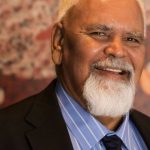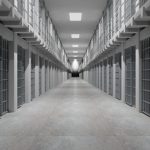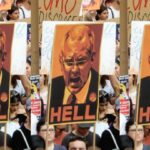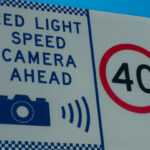Arrested Over Protesting Gaza: Wage Peace’s Margaret Pestorius on the NSW Antiprotest Regime
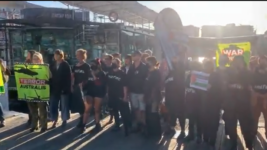
Friends of protest group Wage Peace converged on Sydney’s King Street Wharf on 6 November, the eve of the three-day long Indo Pacific Naval Expo, to highlight that it’s the arms traders at events such as these that profit from atrocities like the Israeli perpetrated genocide in Gaza.
“The intention of the action was to draw attention to the fact that there are corporations and individuals in this world who profit from the sale of weapons, and thus have a vested interest in the continuation and escalation of armed conflicts around the world,” the group outlined in a statement.
The peace activists gathered in front of a boat where organisers were staging a dinner on the harbour, and they chanted, “War crimes start here. End your corporate reign of fear.” And so annoyed were attendees that some pushed and shoved protesters, even laying in the odd punch.
NSW police arrived on the scene soon after the action commenced to arrest two protesters. And according to Wage Peace Australia activist educator Margaret Pestorius the officers then returned on the following days, brandishing a list of activists, whom they began arresting one-by-one.
Strategic incapacitation
As the Wage Peace post-mobilisation statement outlines, NSW police are employing a technique called strategic incapacitation, which commences with the framing of peaceful protesters as somehow posing a threat or harm to the community because they won’t refrain from mobilising.
The group underscores that there is no such thing as an unlawful protest, rather activists may break the law when protesting. And it’s this use of the false concept of an illegal demonstration, coupled with the idea that agitators pose a threat of harm, that promotes an environment for arrest.
Wage Peace further outlines that NSW law enforcement has either been charging demonstrators with harsh new antiprotest offences or multiple lesser offences, with both leading the way for the imposition of severe bail conditions that aim to shut down the individual and the group as a whole.
So, following such a crackdown, multiple activists are no longer able to partake in political activity, as they’ve been barred from contacting fellow protesters in a move designed to shut down the broader social movement.
Colonial legacies
In April 2022, the NSW Perrottet government enacted a new antiprotest regime that sees those charged with obstructing tunnels, bridges, roads or major facilities as part of a demonstration facing penalties of up to two years gaol time or a $22,000 fine.
The King Street Wharf agitators, however, were instead charged with multiple lessor crimes, including the offence of unlawful assembly, which is contained in section 545C of the Crimes Act 1900 (NSW) and carries a maximum prison term of 6 months.
Sydney Criminal Lawyers spoke to Margaret Pestorius about the tactics that NSW authorities are taking to protest at a time when the right to gather in public has been under an escalating attack, and the fact that it now seems to be unlawful to show Palestinian solidarity.
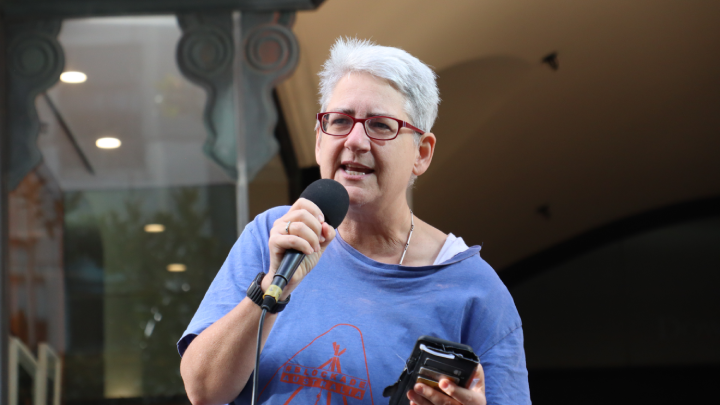
Margaret, friends of your antiwar group, Wage Peace, have carried out nonviolent disruptions in public with the aim of raising issue with weapons companies profiteering from death and encouraging conditions that lead to conflict in order to provoke war to create weapons demand.
On Monday 6 October, these friends of Wage Peace staged a blockade at Sydney’s King Street Wharf, close to the site of the Indo Pacific International Maritime Expo, which resulted in blocking the way for event participants trying to get onto Starship Sydney to hold a harbour cruise.
So, with the ongoing genocide in Gaza having led to this action, why would you say the expo was prime for such a demonstration?
Until last month, there had been little interest in the arms trade. But the BDS (Boycott, Divestment and Sanctions) project has focused everybody, with the Gaza genocide, on the weapons that are acting as a tool for it.
People in the broader Palestinian movement are focusing explicitly on the weapons industry. So, it was a prime moment for responding in that context, because there is a lot of new interest.
It enabled new invitations and new collaborations. New collaborations became possible with the outrage over what is happening in Gaza. And that yacht cruise was attended by the last defence industries minister Melissa Price and the current minister Pat Conroy.
A lot of the people are new to this situation, so they didn’t realise the politicians would be there. But we knew.
Those from the expo didn’t seem to realise that we were going to be there either, so we took the space around the yacht, which left punters unsure of what they should do.
So, we got to see the AMDA charity workers upfront: these people who organise these events. My concern was that they were so angry about us being there that they might harm one of the young demonstrators attending.
I put myself in between the AMDA event managers and the younger people. So, it wasn’t so much that we were blocking them, but we took the space in front of the ship to show what we thought about the war on Gaza and the genocide.
So, the businesspeople at the expo were hostile towards protesters?
Well, the events manager was first. They’re from AMDA. They’re the organisers of Land Forces Brisbane, the Indo Pacific Expo and the Avalon Airshow.
The AMDA representative started off with, “Shove off, you mole,” which was directed towards me. That’s how he approached me. And the other people arriving took their cue from the events manager and behaved badly. They pushed and punched people.
The NSW police took about 10 to 15 minutes to get there.
So, how were the actions of law enforcement on the day? And would you say the NSW police has changed its approach to protest in general since Perrottet rolled out the extreme antiprotest regime in April last year?
The policing is distinct from the antiprotest laws that were rolled out. On the day, a detective from Strikeforce Guard showed up in his t-shirt and board shorts. He pointed out people he knew and directed plainclothes police to pick them up.
I called him out whilst speaking on the street corner about what they were doing and what they have done over the past couple of years in regard to young people trying to take a stand on climate change.
Then, the next day, they started to pick up other people, starting with me. So, first thing in the morning, we were doing a simple protest, and the inspector looked at me and said, “You are under arrest.”
So, by that second morning, they had formulated a list. And then they went around and picked people up in the Sydney environment movement based on that list.
They picked people up who were doing simple protests at the Indo Pacific Expo, and they picked people up who were waiting to pick people up from the watchhouse.
What I realised is that nothing has changed over the last 18 months, and, in fact, extreme Sydney policing has now been embedded into its everyday practices. These are techniques it had been trialling over the recent years of the pandemic.
Strikeforce Guard doesn’t really exist anymore. But they have a unit that acts like it when need be.
So, the state of protest in NSW has been frozen as it was in mid-2022, when the police cracked down on the series of demonstrations that had been temporarily banned under the terms of how the authorities were operating during the pandemic.
They practised this methodology called strategic incapacitation, which has now been operationalised into their ordinary daily policing practices.
It’s about total control of ordinary people through bail conditions.
The police are using a list of names of demonstrators who might be present on the day and may warrant arrest in response to partaking in an event.
So, where are the names that appear on this list coming from?
They’re picking up the people who had some association with the Blockade Australia protests in mid-2022.
That’s the people that they think have an association with Blockade, because I don’t really have one, but they think I do. I have never done another protest with this group of people.
I have never done an action with Blockade beforehand or since. I have picked up people at the watchhouse before. They think I am part of Blockade, but they are wrong.
They would have looked at the livestream, looked at known actors, made themselves a list and then rolled it out.
This is their preferred methodology. They are using strategic incapacitation, which involves police routinely applying inflated charges, with inflated charges then bringing onerous bail conditions and increased surveillance of civil society actors.
The strategy is to lay serious charges and then the seriousness of the charges warrants the harsh bail conditions, which effectively prevent people from participating in political activity.
They then continually adjourn the case in an effort to keep the people on bail and out of the mobilising activist relationships that they’re in.
So, we spoke about this last in February, when you first described that NSW police is operating in this manner. And it appears what we are seeing now, is more of the same?
That’s right. We’ve now demonstrated that is what they are doing. In fact, when I was in the watchhouse, the manager came in and asked why these people were on such steep bail conditions, adding that it was ridiculous.
Then we heard them say that the direction came from above. And we saw the same detectives on the ground arresting people as had been the case in mid-2022.
So, nine demonstrators were arrested last week in relation to the Monday evening action. This happened over several days. They were all charged with multiple crimes, including unlawful assembly.
Were those subject to a charge then loaded up with draconian bails restrictions?
The charges were low. But what they did is charge us with five separate charges each – multiple charges. And we all got very onerous bail conditions.
So, your previous bail conditions from your earlier charge for participating in the Blockade Australia protest in June last year were dropped, as a lawyer demonstrated in court that they were a breach of your human rights.
But now you’re facing a list of new bail conditions, which continue to be questionable in terms of basic rights?
This time they didn’t even give us time to leave NSW. They said you have to leave the state straightaway and if you don’t go, we’re going to pick you up and arrest you again.
Then they locked up one young woman again. She said that she didn’t have time to leave, and the magistrate let her go.
So, they’re running you out of town now if they see you?
That is right. And there is no evidence that’s allowed.
Another idea is that the authorities like to have these climate defenders on at least one bail condition, as this permits them to do a particular type of policing and it enables them to control us if they run into us again.
So, just one bail condition is enough to keep you on the system or mount a case. They use them to monitor and control.
The other aspect to what you’ve set out is that the police were conducting these cases under the April 2022 NSW antiprotest regime laws, which provided for the application of steep bail conditions.
However, as these cases began to go before the courts, the draconian charges were then dropped and replaced with lesser ones that fit the crimes more adequately.
Is this still occurring?
You can have a higher charge or multiple lesser ones. The way they frame the facts then makes us seem dangerous. They say we’re dangerous even though we have no history of harming anybody. They just call us dangerous.
They conflate noncompliance and disobedience with the intention to cause harm. That is one of the first things they do in the statement of facts.
So, by beating up this idea of intention to cause harm in the statement of facts, they don’t then need to present any real evidence of an intention to cause harm. They don’t accompany these assertions with real evidence.
The magistrate then becomes confused by this series of assertions and in the end, the magistrate often follows through on what they’ve requested.
So, right now, I am on police bail, and the cop shop police were bullied by the detectives into placing that bail on us, and then they went on to bully us in order to ensure that we did sign for the bail conditions.
They said, “If you do not sign the conditions, we will put you in gaol.” They put me back three times, because I said no every time. And each time they slammed the cage shut and said if I didn’t sign, I would be put in prison.
I said this was totally unreasonable, as I couldn’t leave Sydney straightaway. But they said it was bad luck, and I had to sign and leave the state immediately.
So, they’re now applying multiple lesser charges, which provides them with a similar excuse to applying severe bail conditions that debilitate the activist and dissolve the movement.
I wouldn’t say dissolve the movement. A better way of putting it is that it interferes with the relationships within the movement. They will also use this charge “unlawful assembly”.
This is assembly with intent to do harm. One of its elements is people gathered with the intent to cause harm. It is an old charge. It appears to have developed out of gang-related violence. It involves instances where people have met in a public place to harm each other.
That is what they have done this time. They use this danger element to make a case, even though there is no evidence that we are dangerous. There is no past evidence showing that we pose anyone any kind of harm. We don’t escalate to harm.
So, how would you say the bail conditions once applied then eat away at the movement?
We have three or four bail conditions. One is to leave the state. So, I can’t move around in NSW forming these sorts of relations. I was going to go to McBride’s trial and support him. I was also going to go to Stephen Langford’s case and support him later this week in Sydney.
You can’t do training, scouting or planning for action, under these conditions. That means not being able to talk to anybody about what I do every day of my life. I don’t do anything but that. It is my life.
The third one is that I shan’t associate with Wage Peace. But we don’t have a membership, and nobody knows who that actual group of people is.
So, they can pick me up on any of those things, even though they’re no different from my everyday civic activity. There is no difference. This is the thing about political activity by civilians. There is no dividing line between my being as an activist and whatever else it is that they seem to think I do.
That is what article 21 is about: the right to assemble in social groups that may or may not have political elements, because you can’t tell if it is just a barbeque or if it is a barbeque where the political state of society is being discussed.
There is no dividing line. The police think they can see some dividing line. But they can’t. We are civil society actors. They cannot make this distinction.
For about 40 days now, the Israeli government has been slaughtering the 2.3 million Palestinians residing in the Gaza Strip to punish them in relation to some incursions Hamas carried out on 7 October.
The death toll has soared to over 11,000 people in Gaza killed, with one out of every twenty people killed in the region.
Many people are commenting on the fact that this genocidal event is taking place in relation to a captive population, which is locked inside the walls that border Gaza, and it’s like nothing we’ve seen before in terms of size, the fact the globe is watching and the disconnect Western leaders are showing in relation to the rest of humanity.
Margret, how do you think this atrocity is going to impact us all moving forward? Are their changes up ahead that will be necessitated due to humanity having watched on during such horror?
Society has witnessed several genocides, where the aim has been to eradicate entire groups of people from land. There was Kosovo and Rwanda.
We started here with a long series of ten-year eradications from land. This has been going on for 200 years at least here.
But the Palestinians are organised, and their diaspora was ready for this. I’ve heard them say that they have a willingness to live and create.
This has created the ability to see what’s going on this time in a way regarding the racism of colonial societies that have not been able to see clearly what’s happened in the past, compared to what we see now.
We are all in a moment where we have to exercise against militarism, against racism and social superiority. And we also have to keep an eye on the climate crisis, as that is also a mass eradication of people. This week a whole city in Africa went underwater.
So, there are these localised climate genocides going on across the planet every week at the moment. This is a time to organise.
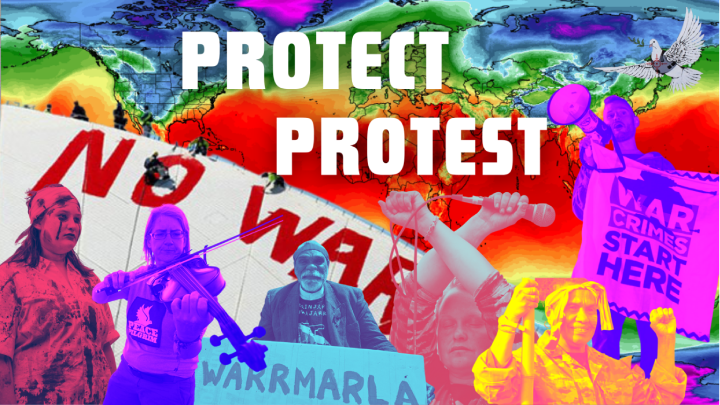
And I’ll just ask you, you said that every ten years there was a genocide on this continent.
Australia is made up of a rolling series of 10-year genocides as they moved across the country. Sydney had one from 1800 to 1810 and then it went north to the next river for the next 10-year period.
If you look at the Frontier Wars, they roll out at 10-year sets. Boe Spearim says it wound down about the 1930s. Then after that you get a peeling back on colonisation.
The results still occur, however. And there is evidence that the methodologies still occur, including the policing. This policing we are seeing is connected to genocide policing for sure.



